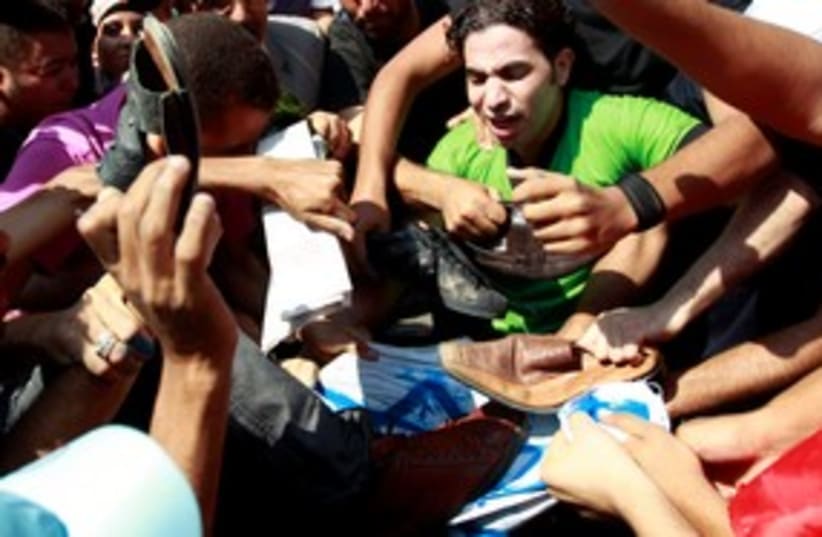RELATED:Barak apologizes to Egypt over security officers' deathsIsrael’s fleeting contentment has once again been sabotaged by regional resentment.There we were at the beginning of last week, basking in the contentment of summer’s discontent—“tent “being the operative syllable in both of those words—and blissfully ignoring the Arab Fall lurking ominously on September’s horizon. Then the weekend beckoned and with it our region’s favorite pastime, the blame game. The key players in the latest round of this ancient game? Egypt versus Israel.And the aim of the game? Well that too is nothing new. Once again, the goal has been unilaterally decided upon by the other team: Namely, that Israel must apologize.The game is played as follows: The opponent takes action against Israel which either violates state security or international law; Israel retaliates in what invariably ends up being a “regrettable incident”—usually involving the loss of life on the opponent’s team; this is closely followed by the opponent threatening to sever diplomatic ties unless Israel apologizes. At this stage the game is usually suspended in an indefinite stalemate, with both sides incapable of accepting the prospect of being the loser.The last round of the blame game had a different opponent but was played according to the same set of skewed rules. In that round, Israel’s opponent was Turkey. The Turkish government makes the first move by supporting the IHH-backed flotilla—the IHH being a terrorist organization—and its illegal breach of the Gaza blockade. Israel defends itself by boarding the Mavi Marmara and killing nine activists. Turkey gets mad at Israel for breaking the rules (only the side that makes the rules is allowed to break them you see) and demands that Israel apologizes.Last week the latest round of the game unfolded in Sinai – the stretch of land that best symbolizes Israel’s land-for-peace sentiments. Yet recently, the “peninsula for peace”—as President Shimon Peres fondly referred to it this week—has turned into a playground for terrorists. As demonstrated by an increasing number of attacks in the area by Islamic fundamentalists, the central government in Egypt is—in Defense Minister Ehud Barak’s words—“losing its grip” over the Sinai peninsula.With Israel’s permission, Egypt deployed armed forces into Sinai earlier in the week. But Thursday’s attack on the road to Eilat killing 8 Israelis tragically proved their efforts to be ineffective. Taking matters into their own hands, the IDF opened fire on the terrorists and in the process killed members of Egypt’s security forces.Cue the calls for an apology. Not—Allah forbid—for Egypt to apologize for allowing terrorists to traverse its borders and plan a deadly attack against Israel, but, in a case of the lady doth protest too much, Israel is being asked to apologize to Egypt for a military blunder that was the direct result of its own inefficiency.Which, incidentally, Barak did in Saturday’s statement of regret.But judging by the numbers of protesters burning Israeli flags in Cairo, Alexandria and the Suez, it wouldn’t have made a difference if Israel would have accepted the blame for all Egyptian woes - including, say, the fact that Egypt is listed as the in the world for religious freedom, or the fact that over 1.5 million Egyptian children are child laborers.No, it wouldn’t have made a difference because in actual fact, the aim of the game has nothing to do with apologies at all. Just like our ongoing game with Turkey, Egypt isn’t really interested in getting an apology from Israel.The aim of the blame game is simply to continue playing it for as long as possible.Just as Israeli society’s own game of tent protests served the additional purpose of deflecting the country’s focus – even momentarily - from real threats, Egypt and Turkey play the Blame Israel Game to take the heat off of some of their own internal strife.The message is clear: Don’t be mad at your country for say, PKK terrorism, Syrian refugee crises, attacks on Coptic Christians, terrorism in the desert – no, instead be mad at Israel because they didn’t apologize.The fate of diplomatic ties with Israel, regardless of whether or not an apology is forthcoming, will be determined only by the internal situation in those Muslim states. The rules are such that no matter what hand it plays, Israel can never come out the winner.Perhaps then, it’s time for Israel to cash in whatever is left of its chips and quit trying to play this pathetic game.Then we can crawl back into our tents and begin our countdown towards September’s new game at the UN.
The writer is editor of The Jerusalem Post's Premium Zone.
